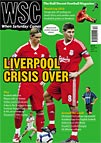 This month marks the 40th anniversary of League games being shown live in Scandinavia, as Lars Siversten reports
This month marks the 40th anniversary of League games being shown live in Scandinavia, as Lars Siversten reports
“We don’t train tomorrow, so tonight we’re going out to celebrate. But if Exeter had equalised Leeds’ 2-1 lead at the death I would have cancelled the whole thing.” Surprisingly not the words of some overzealous Yorkshireman but those of Kjetil Rekdal, manager of Norwegian club Aalesunds FK, talking to the press after his team had gone through to the semi-finals of the Norwegian cup. How could shoddy defending in League One possibly endanger a group of jubilant Norwegian footballers’ plans for the evening?
On November 29, 1969, Sunderland travelled to Molineux to take on Wolves. It was an unremarkable encounter and there was really nothing to suggest that the game could be the dawning of any kind of new era anywhere. Nevertheless, it was. It was the first English game to be televised live in Scandinavia and these weekly games became nothing short of a cultural and social phenomenon. Each weekend everyone with an interest in football, that is to say most Scandinavians, would gather in front of televisions to watch the latest match.
Scandinavians have always had a soft spot for English football. As early as the 1920s the Norwegian daily press was providing coverage of English football and when state-run football pools were introduced in the late 1940s the first ever coupon consisted solely of English matches.
As the years went by interest in English football continued to grow and in 1969 the state-run Norwegian broadcasting corporation, along with its Swedish and Danish counterparts, began screening a live English match every Saturday. Over a decade before ITV started providing the same service in England, Scandinavians were watching live football from the English top flight every weekend.
The skill of the English players as well as their physical approach to the game struck a chord with the Scandinavian public, who started looking at English football as a template for how the game should be played. With this in mind, the famously mad ravings of Norwegian commentator Bjorge Lillelien when Norway defeated England in 1981 seem all the more understandable.
He hadn’t just seen his usually woeful national side beat one of the heavyweights of the game, he had seen them beat the undisputed kings of the sport. “We’re the best in the world! We’re the best in the world! We’ve beaten England 2-1 at football! It’s quite unbelievable!” he chimed. At no point did he feel compelled to mention that at the time it was 11 years since these kings of the sport had participated in a World Cup finals. Lillelien, like any other football-loving Scandinavian who grew up in the 1970s and 80s, was brought up to believe that English football represented the indisputable pinnacle.
And it’s no wonder the Scandinavians had to look abroad for idols. In Norway, professional football was only introduced in 1991; prior to that players were amateurs or, at best, semi-pros. People supported their local club, but it was as if they were playing a different sport and no one felt it morally objectionable to support an English club as well. This caused much confusion and emotional unrest in the Norwegian city of Bergen when the local team SK Brann faced Liverpool in the quarter-finals of the 1997 Cup-Winners Cup. The first leg ended 1-1 before Liverpool won 3-0 at Anfield.
Rekdal has been a passionate Leeds fan since 1974. A successful playing career that saw him capped 83 times for his country and score a winning goal against Brazil in the 1998 World Cup has done nothing to dull that passion. In fact, as a player with Belgian side Lierse he is said to have had a clause in his contract which enabled him to keep up with Leeds results on BBC radio during half-time intervals. He typifies a generation of Scandinavians who fell in love with the English game while growing up and who remain faithful to this day.
While interest in English football was always there in Scandinavia, the national broadcasters’ decision to show weekly games 40 years ago caused it to explode. Today of course the Premier League is an international broadcasting behemoth, seemingly intent on conquering every advertising market in the known universe. We’ve come a very long way indeed since that day at Molineux when Hugh Curran gave Wolves a 1-0 win over Sunderland and the English top flight truly started its march towards becoming the most popular league in the world.
From WSC 274 December 2009